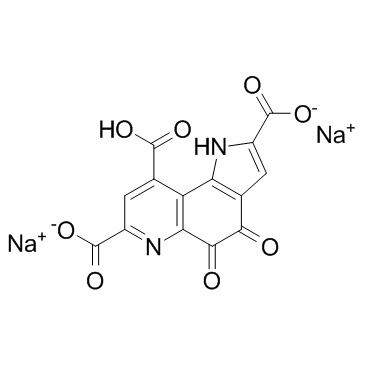Partial peptide of α-synuclein modified with small-molecule inhibitors specifically inhibits amyloid fibrillation of α-synuclein.
Wataru Yoshida, Natsuki Kobayashi, Yasuhiko Sasaki, Kazunori Ikebukuro, Koji Sode
Index: Int. J. Mol. Sci. 14 , 2590-600, (2013)
Full Text: HTML
Abstract
We have previously reported that pyrroloquinoline quinone (PQQ) prevents the amyloid formation of α-synuclein, amyloid β(1-42) (Aβ(1-42)), and mouse prion protein. Moreover, PQQ-modified α-synuclein and a proteolytic fragment of the PQQ-modified α-synuclein are able to inhibit the amyloid formation of α-synuclein. Here, we identified the peptide sequences that play an important role as PQQ-modified specific peptide inhibitors of α-synuclein. We demonstrate that the PQQ-modified α-Syn(36-46) peptide, which is a partial sequence of α-synuclein, prevented α-synuclein amyloid fibril formation but did not inhibit Aβ(1-42) fibril formation. In addition, the α-synuclein partial peptide modified with other small-molecule inhibitors, Baicalein and epigallocatechin gallate (EGCG), prevented α-synuclein fibril formation. Currently reported quinone amyloid inhibitors do not have selectivity toward protein molecules. Therefore, our achievements provide a novel strategy for the development of targeted specific amyloid formation inhibitors: the combination of quinone compounds with specific peptide sequence from target proteins involved in amyloid formation.
Related Compounds
| Structure | Name/CAS No. | Molecular Formula | Articles |
|---|---|---|---|
 |
Pyrroloquinolinequinone disodium salt
CAS:122628-50-6 |
C14H4N2Na2O8 |
|
Characterization of interactions between methoxatin disodium...
2015-01-01 [Biomed. Chromatogr. 29(1) , 123-8, (2014)] |
|
Metagenomic analysis of the bacterial community associated w...
2015-01-01 [Microbes Environ. 30(1) , 63-9, (2015)] |
|
Genome-wide RNA sequencing analysis of quorum sensing-contro...
2015-12-01 [Appl. Environ. Microbiol. 81 , 7993-8007, (2015)] |
|
Pyrroloquinoline-quinone suppresses liver fibrogenesis in mi...
2015-01-01 [PLoS ONE 10(3) , e0121939, (2015)] |
|
Novel Route for Agmatine Catabolism in Aspergillus niger Inv...
2015-08-15 [Appl. Environ. Microbiol. 81 , 5593-603, (2015)] |